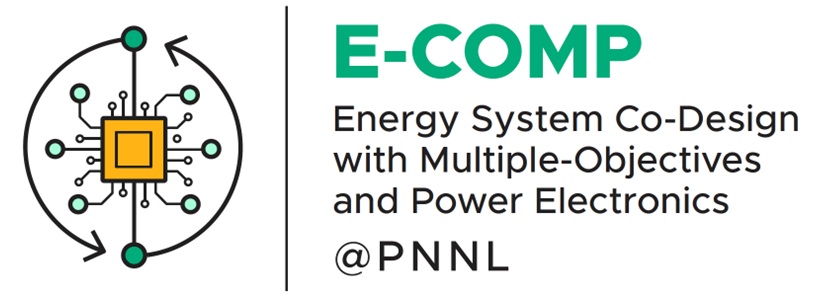E-COMP Initiative Summary
Advancing Co-Design for a Resilient and Intelligent Power Grid

In an era increasingly dominated by power electronics and decentralized energy resources, the E-COMP Initiative at PNNL is transforming how modern power systems are designed, optimized, and operated. As the grid evolves to accommodate growing demand, bidirectional power flows, and new technologies at the grid edge, E-COMP is developing complementary advanced methodologies to seize these real-world energy opportunities.
E-COMP's Mission

E-COMP pioneers multi-objective optimization of energy systems by integrating cutting-edge modeling, simulation, and co-design approaches. The initiative focuses on filling critical gaps in understanding power electronics-based systems and their complex interactions, ensuring reliable, secure, and cost-effective energy solutions.
E-COMP's Approach
E-COMP integrates three tightly coordinated research thrusts to deliver innovative solutions:
- Theory and Modeling
- Objective: Develop foundational theory and models to characterize the stability, dynamics, and interactions of power electronics-dominated systems.
- Key Contributions:
- Creation of Power Electronics Mixed Dynamics theory, which examines the interplay between fast dynamics of power electronics and slower traditional machine dynamics, to understand the stability and interactions in power systems dominated by power electronics.
- Advanced methods like energy function-based stability analysis, which derives stability properties and identifies forced oscillations, and Equivalent Laplacian-based approaches, which characterize system oscillations using network-weighted matrices.
- Parameterized models for control co-design that balance accuracy and computational efficiency.
- Multiscale, Multi-Objective Co-Design
- Objective: Develop co-design frameworks and algorithms that simultaneously optimize system design and operational strategies across multiple objectives and timescales.
- Key Contributions:
- Hierarchical optimization techniques incorporating nested multiscale dynamics and uncertainty.
- Advanced Pareto optimization algorithms for trade-off analysis.
- Modular co-design tools enabling flexible integration with simulation environments.
- Multi-Entity Simulation
- Objective: Build an agent-based simulation platform to assess localized decisions' impacts on broader energy systems.
- Key Contributions:
- A multi-entity simulation framework leveraging PNNL’s HELICS platform and agent-based modeling techniques.
- Evaluation of policy, market, and incentive strategies to optimize distributed energy resources.
- Use of co-simulation tools to model and simulate interconnected systems under real-world conditions.
Real-World Applications
E-COMP's research directly supports grid modernization by addressing practical challenges. Key examples include:
- Large New Generation/Load Integration: The E-COMP team is examining strategies for hybrid AC/DC systems, meshed grid configurations, and data center integration to enhance resilience and stability.
- Community Energy Planning: Supporting reliable and affordable energy for remote and rural communities with E-COMP's Remote Communities on the Olympic Peninsula (RECOOP) prototypical use case. This use case includes localized generation and storage solutions that deliver resilient, autonomous energy delivery.
E-COMP's Deliverables
E-COMP will establish a library of use cases, create cutting-edge modeling and simulation tools, and deliver practical outcomes, including:
- Tools for stability characterization and optimization.
- A flexible co-design framework to address diverse energy challenges.
PNNL’s Leadership
As a leader in energy system innovation, PNNL brings unmatched expertise in power systems, optimization, simulation, and cybersecurity to E-COMP. Supported by state-of-the-art infrastructure, including hardware-in-the-loop testbeds and high-performance computing, PNNL collaborates with stakeholders to deliver solutions that address today’s challenges while preparing for tomorrow’s energy landscape.
Join Us
E-COMP is more than an initiative—it’s a pathway to an affordable, resilient energy future. Explore cutting-edge research, collaborate with experts, and be a part of the innovation in energy system co-design.